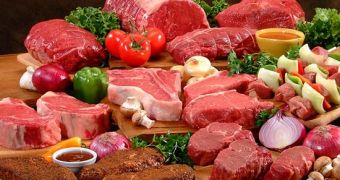A team of researchers writing in the scientific journal Nature Medicine explain how, despite its having relatively low levels of both fat and cholesterol, lean steak can still prove detrimental to one's heart, provided that it is not consumed in moderation.
As these specialists explain, the problem is not the lean steak in itself that can cause people to develop artery clogging.
Quite the contrary: what red meat consumers need worry about is the fact that bacteria found in the guts of most individuals cause a nutrient found in this food source to turn into a chemical compound whose presence in the organism “encourages” arteries to grow plaques inside themselves.
“Bacteria make a whole slew of molecules from food, and those molecules can have a huge effect on our metabolic processes,” study co-author Stanley Hazen reportedly said.
Stanley Hazen and his colleagues decided to investigate the link between red meat and heart diseases after several previous studies had shown that, despite their keeping a close eye on fat and cholesterol levels, people who ate said type of meat on a regular basis still had a rather elevated risk of dying because of a heart disease.
As part of their investigation, the specialists asked a total of 77 volunteers, 26 of whom were either vegans or vegetarians, to consume a nutrient known as l-carnitine, Nature informs us.
Thus, it was discovered that, following their exposing their organisms to said nutrient, all volunteers experienced an increase in their blood levels of TMAO (i.e. trimethylamine-N-oxide, a chemical that negatively affects the organism's ability to get rid of the cholesterol that tends to accumulate inside the walls of arteries).
However, the vegans and the vegetarians, whose gut bacteria are known to be different from those of meat-eaters, ended up producing significantly lower amounts of TMAO than the latter.
The idea that l-carnitine only constitutes a threat to one's wellbeing when turned into TMAO by gut bacteria was backed up by the data collected while analyzing the medical records of a total of 2,600 people and by the findings of several experiments carried out on mice.

 14 DAY TRIAL //
14 DAY TRIAL //